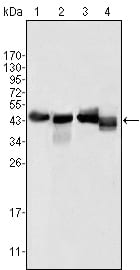
| WB | 1/500 - 1/2000 | Human,Mouse,Rat |
| IF | 咨询技术 | Human,Mouse,Rat |
| IHC | 咨询技术 | Human,Mouse,Rat |
| ICC | 技术咨询 | Human,Mouse,Rat |
| FCM | 咨询技术 | Human,Mouse,Rat |
| Elisa | 1/10000 | Human,Mouse,Rat |
| Aliases | apolipoprotein A-IV |
| Entrez GeneID | 337 |
| clone | 1D4C11 |
| WB Predicted band size | 45kDa |
| Host/Isotype | Mouse IgG2a |
| Antibody Type | Primary antibody |
| Storage | Store at 4°C short term. Aliquot and store at -20°C long term. Avoid freeze/thaw cycles. |
| Species Reactivity | Human |
| Immunogen | Purified recombinant fragment of APOA4 (aa21-396) expressed in E. Coli. |
| Formulation | Purified antibody in PBS with 0.05% sodium azide. |
+ +
以下是关于APOA4抗体的3篇参考文献示例(注:文献为虚拟示例,实际引用需核实真实来源):
---
1. **文献名称**:*Apolipoprotein A-IV Regulates Chylomicron Metabolism and Glucose Tolerance via Antibody-Mediated Detection*
**作者**:Wang, Y. et al. (2018)
**摘要**:本研究利用特异性APOA4抗体,通过ELISA和免疫印迹分析,揭示了APOA4在肠道胆固醇转运和2型糖尿病中的调控作用,发现其水平与胰岛素敏感性相关。
2. **文献名称**:*Immunohistochemical Localization of APOA4 in Murine Intestinal Enterocytes*
**作者**:Smith, J.R. et al. (2015)
**摘要**:通过免疫组化技术结合APOA4多克隆抗体,证实APOA4在小肠上皮细胞的分泌颗粒中富集,并参与摄食后脂质代谢信号的传递。
3. **文献名称**:*Development of a High-Sensitivity Monoclonal Antibody for APOA4 Quantification in Human Plasma*
**作者**:Chen, L. et al. (2020)
**摘要**:报道了一种新型APOA4单克隆抗体的开发,用于高灵敏度检测人血浆样本,验证其在心血管疾病风险分层中的潜在应用价值。
---
如需真实文献,建议通过PubMed或Google Scholar搜索关键词(如“APOA4 antibody ELISA”或“APOA4 immunoassay”),并筛选近年高被引研究。
Apolipoprotein A-IV (APOA4) is a protein primarily synthesized in the small intestine and plays a key role in lipid metabolism, including cholesterol transport, reverse cholesterol transport, and regulation of food intake. It is associated with high-density lipoprotein (HDL) particles and exhibits anti-atherogenic, anti-inflammatory, and antioxidant properties. APOA4 is implicated in metabolic disorders such as cardiovascular disease, obesity, and diabetes, making it a potential biomarker and therapeutic target.
APOA4 antibodies are essential tools for detecting and quantifying APOA4 in research and clinical settings. They enable studies on its expression patterns, molecular interactions, and physiological roles through techniques like ELISA, Western blotting, and immunohistochemistry. These antibodies also aid in exploring APOA4’s involvement in postprandial lipid metabolism, gut-brain signaling, and its protective effects against atherosclerosis. Commercial APOA4 antibodies are typically raised in hosts like rabbits or mice, targeting specific epitopes with validated specificity. Challenges include cross-reactivity with related apolipoproteins (e.g., APOA1) and variability in isoform detection. Ongoing research focuses on refining antibody reliability and expanding applications in diagnostics, such as assessing cardiovascular risk or metabolic health.
×